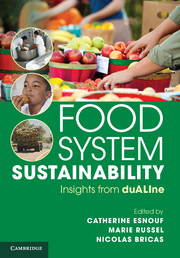Book contents
- Frontmatter
- Contents
- Foreword
- Acknowledgements
- Introduction
- 1 Context: new challenges for food systems
- 2 Consumption and consumers
- 3 Carbon footprint and nutritional quality of diets in France
- 4 Food systems
- 5 Industrial organisation and sustainability
- 6 Urbanisation and the sustainability of food systems
- 7 Losses and wastage
- 8 International trade, price volatility and standards for sustainability
- 9 Elements for a foresight debate on food sustainability
- 10 A critical panorama of methods used to assess food sustainability
- Conclusion
- References
- List of abbreviations
- List of duALIne experts
- Index
3 - Carbon footprint and nutritional quality of diets in France
Published online by Cambridge University Press: 05 April 2013
- Frontmatter
- Contents
- Foreword
- Acknowledgements
- Introduction
- 1 Context: new challenges for food systems
- 2 Consumption and consumers
- 3 Carbon footprint and nutritional quality of diets in France
- 4 Food systems
- 5 Industrial organisation and sustainability
- 6 Urbanisation and the sustainability of food systems
- 7 Losses and wastage
- 8 International trade, price volatility and standards for sustainability
- 9 Elements for a foresight debate on food sustainability
- 10 A critical panorama of methods used to assess food sustainability
- Conclusion
- References
- List of abbreviations
- List of duALIne experts
- Index
Summary
This chapter presents some original findings based on a study of the carbon footprint of food in France. Factors that are liable to explain the inter-individual variability of the carbon footprint associated with the usual food consumption of a representative sample of French adults were explored. By analysing the relationship between the nutritional quality of food and its carbon footprint, this chapter also addresses the more general issue of the compatibility of two of the pillars of sustainability.
The authors would like to thank the ADEME and INRA for their financial support that enabled this study to be conducted.
Introduction
Initial observations of the environmental impact of food demonstrated a broad inter-individual variability of this impact (even when taking account of variations in energy consumption). This contributed to the suggestion that dietary choices could simply be altered (i.e. replacing certain foods) to reduce the environmental impact of food (Carlsson-Kanyama et al., 2003; Coley et al., 1998). In particular, a reduction in the consumption of red meat from ruminants was suggested, because it is the production of these foods that generates the most greenhouse gas emissions per kilocalorie (kcal) (approximately 11 g eqCO2/ kcal) (Kling and Hough, 2010).
- Type
- Chapter
- Information
- Food System SustainabilityInsights From duALIne, pp. 51 - 68Publisher: Cambridge University PressPrint publication year: 2013
- 1
- Cited by



